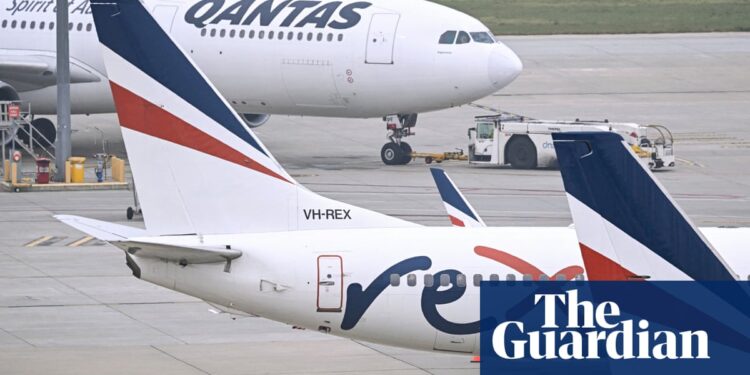Domestic airfares have increased by 13% following the collapse of Rex’s flights between capital cities, the consumer watchdog has found, as Qantas and Virgin’s duopoly has surged to 98% market dominance.
The Australian Competition and Consumer Commission (ACCC) found that since Rex suspended its jet operations between metropolitan cities across 11 routes and entered administration, the average airfare on all major city routes increased by 13.3% in the quarter to September 2024.
The average cheapest economy tickets increased dramatically on routes formerly serviced by Rex: Adelaide to Melbourne services jumped 95% to $296; Melbourne to Gold Coast was up 70% to $432; and Canberra to Melbourne rose 54% to $298.
Four operators competed on the Melbourne to Gold Coast route before low-cost carrier Bonza’s collapse – but now just two remain.
Flights are also fuller as a result of Rex’s exit from the market, with the number of seats on capital city routes falling by 6% despite passenger numbers remaining stable, according to the ACCC’s latest domestic airline monitoring report.
The ACCC commissioner, Anna Brakey, said the 13% average spike in airfares corresponded with “a less competitive domestic airline sector”.
Despite jet fuel prices falling by 41% in the 12 months to September, domestic airfares have remained steady. Meanwhile, average international airfares departing Australia decreased by 5-10% in the same period, the ACCC said, citing data from Flight Centre.
Brakey noted the airline sector had become drastically less competitive following the collapse of Bonza and Rex’s jet operations in 2024.
“While we also typically see a seasonal peak in air travel in September due to major sporting events and school holidays, there were additional pricing pressures this year,” she said.
“Passengers were no longer able to access the lower fares that Rex offered, and airline seating capacity decreased following Rex’s exit. This in turn has contributed to higher airfares.”
Earlier this year, almost half of all passengers flew on routes with either three or four airline groups, the ACCC said. But by November, no domestic route is serviced by more than two major airline groups, with Qantas Group (including budget operator Jetstar) and Virgin Australia servicing 98% of domestic passengers.
“The domestic airline industry has become even further concentrated, and it may be some time before a new airline emerges to compete on popular services between metropolitan cities, with normal barriers to entry and growth exacerbated by aircraft fleet supply chain issues and pilot and engineer shortages,” Brakey said.
Also on Tuesday, Qantas told a Senate committee it does not expect government reforms proposed to help boost competition in and out of Sydney airport will dent its dominating hold of slots at the airport.
The Senate committee hearing is canvassing feedback into reforms proposed by Labor in February to amend the strict laws which limit Sydney airport to 80 take off and landing movements – known as slots – per hour, as well as an overnight curfew.
after newsletter promotion
Despite the scarcity of slots, allocation at Sydney airport follows the global standard, which allows an airline to retain its slot so long as it doesn’t cancel a service more than 20% of the time.
Scott Charlton, the CEO of Sydney airport, told the committee the global 80:20 rule is actually more generously applied in Australia, because cancellations due to inclement weather are exempt from the threshold.
The competition watchdog, aviation experts and smaller airports have long accused Qantas and Virgin of strategically spreading their flight cancellations in and out of Sydney so as to not cancel any service more than 20% of the time and retain the slots to block new entrants and rivals.
Qantas and Virgin have consistently denied they engage in so-called “slot hoarding”. However experts point to the airlines’ cancellation rates that near 10% some months for routes out of Sydney to Melbourne, Brisbane and Canberra, while airlines such as Rex sometimes had zero monthly cancellations on such routes.
The proposed reforms do not tighten the 80:20 slot cancellation “use it or lose it” rule, something Sydney airport had itself called for.
On Tuesday, Markus Svensson, the CEO of Qantas’ domestic operations, told the committee Qantas was likely to support the proposed amendments – pending final details – in part because they appeared to help airlines recover after delays due to weather.
He also said the airline did not expect to lose any of its unused or underutilised slots into Sydney airport as a result of the amendments – a compliance move which its critics have long been calling for.
“We do not apply for slots without having intention to operate them. I categorically deny that the slots are hoarded and [that we’re] trying to play any games here,” Svensson said.







